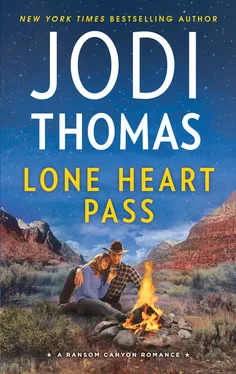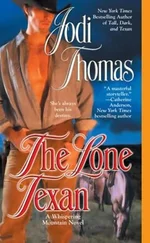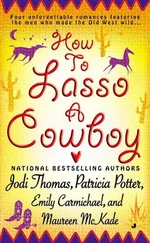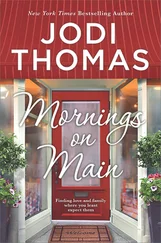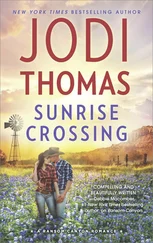If she died, someone would have to wash clothes to bury her. She didn’t even have clean socks. Everything she owned, except a suitcase of dirty clothes, had been packed in a moving pod in November.
“Food,” she said again as she grabbed at something, anything, to wear, fearing the cowboy and the groceries might disappear. Real food. Green vegetables. Fruit. Sweets. She stumbled to the window as she tugged on clothes. “Where’d you find my groceries?”
“You left them in the basket at the store in Crossroads two and a half days ago.” The man bellowed, sounding angry. “They stored them in the cooler thinking you’d return. When you didn’t, the manager hired me to bring them out.”
She straightened, putting on an old army green raincoat as a robe and a worn pair of socks she’d found in one of Grandfather Levy’s drawers. One had a red band around the calf and the other had blue stripes, but who cared.
When she leaned out the window, all she saw was the top of a worn Stetson. “I forgot them? I just thought they evaporated while I was lost, or fell out when I hit the hundred bumps in the road. I didn’t come back for them because I don’t think I could remember how to get back to town. I drove hours before I stumbled on this place.”
The cowboy looked up and she swore he growled. “Could you tell me your life story later? I’d like to set these groceries down.”
He lowered his voice, but she heard him add, “Lady, you’re only twelve miles from town, not lost in the Amazon jungle.”
She moved down the stairs and slowly neared the door, picking up an old umbrella as she tiptoed. The raincoat didn’t reach her knees, but it would have to do.
He must have gotten tired of waiting because he yelled, “You are Jubilee Hamilton?”
She opened the door a few inches and stared at a handsome man dressed in boots, jeans, a worn shirt and a cowboy hat. “How do you know that?”
He smiled at her. “You left your credit card at the store, too.” He studied her a minute, then asked, “You want these groceries or not? If you do, you got to open the door a little wider. If you don’t, I need to be getting back to town.”
She lifted her umbrella. “How do I know you aren’t here to rob and rape me?”
He looked down at the ugly mismatched socks with a hole in the right big toe and then up to what she was sure was wild, dirty blond hair. “It’s tempting, lady, but I’ve sworn off women. Maybe some other time. As for robbing you, I could have already done that. I’ve got your card.”
Jubilee slowly opened the door. “I own this farm, you know.”
He carried in the first bags. “I figured that and it’s a ranch, not a farm.”
“Whatever.” She let her head bobble.
“Old Levy died several months back.” The cowboy didn’t bother to look at her. He just headed to the kitchen. “Heard someone say his big-city great-granddaughter now owned the place and all the land around. When I saw Hamilton on your card, I had a pretty good guess as to where to take the groceries even before the manager told me. You look just like Levy.”
Jubilee straightened. “I do?” She remembered her grandfather as bent over, bald and so tanned he looked as if his skin was leather.
“Yeah. Crazy.” The cowboy still hadn’t turned around to face her so she wasted the nutty cross-eyed look she made just for him.
She followed him to the kitchen. “You knew my great-grandfather? You know this place?”
“Sure. I used to come out and help the old guy. He wasn’t able to do much, but he didn’t mind telling me how. He paid good wages.” The stranger went out for another load.
She followed like a puppy. She was still too tired to make her mind work. Leaning on the umbrella, she simply watched.
When he brought in the last load, he removed his hat and nodded politely just like his mother must have taught him. “I’m Charley Collins. I’m sorry for your loss. I’ll miss the old man. He was always straight with me.”
“What kind of work did you do for my great-grandfather?”
The man called Charley shrugged. “He ran about fifty head. I helped brand in the spring and round up in the fall. Last year I helped him plant his spring hay crop. By the time we harvested, he was too weak to climb into the cab of the tractor. I made sure the hay got into in the hay barn.”
The good-looking man watched her. “You have any idea how to run a ranch of this size, Mary Poppins? It’s not big, but there’s plenty to do.”
She shook her heard. “Nope. Why’d you call me Mary Poppins?”
“It was either that or Paddington Bear. With a rain coat, an umbrella and those ugly socks, you could go either way on Halloween.” The slow grin came from a man who probably knew just how it might affect her. If he’d had new clothes and boots that weren’t scuffed, he could have been a cover model.
She frowned back. Nice try, cowboy, but forget it. I’ve been vaccinated against good-looking men.
His face became serious. “The work’s never done on a place like this. When you’re not farming to provide grain for winter or checking on cattle, you’re mending fences and repairing equipment. If you run cattle, they’ll need checking on every day. The fences need constant repair, and every time it rains part of them will wash out and your workload just doubles.”
“I was afraid of that.” She scratched her wild hair, feeling as if something must have crawled into it and set up house while she slept.
The guy just stared at her as if she was a baby kitten trying to walk on water. “You know, lady, you’re about four months behind already. You might want to think about selling the place and going back to the city. It would take a dozen men to get this place ready for spring in time.”
“I’m staying.” Lifting her chin she met his blue-eyed stare. She didn’t have to tell this stranger she had nowhere else to go. He’d probably figured that out already.
“Then I wish you luck, Miss Hamilton.”
She shook the cobwebs out of her brain and took a step toward her only chance. “Would you work for me? I’ll pay whatever he paid you. To tell the truth, I’m not sure where to start but I’ve got to make this work.” Even if it cost her all her savings.
“I don’t know,” he shook his head. “It’s a long way out here, and I only have one, maybe two days a week open. I don’t think one day a week would make much difference in this place and to come out on weekends I’d have to quit my bartending job. If I did that, I’d lose the free apartment that comes with it.”
Jubilee’s mind cleared enough to realize he was negotiating, not turning down her offer.
“There is a house over by the corrals. When I was a kid, a hired hand and his wife lived there. I don’t know what kind of shape it’s in now. If you’ll work for me five days a week, I’ll pay you five dollars more an hour than Levy did and throw in the house.” She knew she had to make it fair because no one else was probably going to take an offer to help farm on a place in the middle of nowhere.
She didn’t know much about this man, but he was honest or he wouldn’t have brought the groceries and her credit card. He was a hard worker if her great-grandfather used him regularly, and he knew the place.
“Does the school bus stop anywhere near here?”
He surprised her with his question. “I have no idea. Do you have a family?”
“A daughter.” He didn’t look happy about the offer. “If I worked for you, I’d take off time to get her to school, and when she’s here, I’d work around the headquarters so I could keep an eye on her.”
Jubilee looked around the yard. There was enough work within shouting distance to keep him busy for months.
Читать дальше
